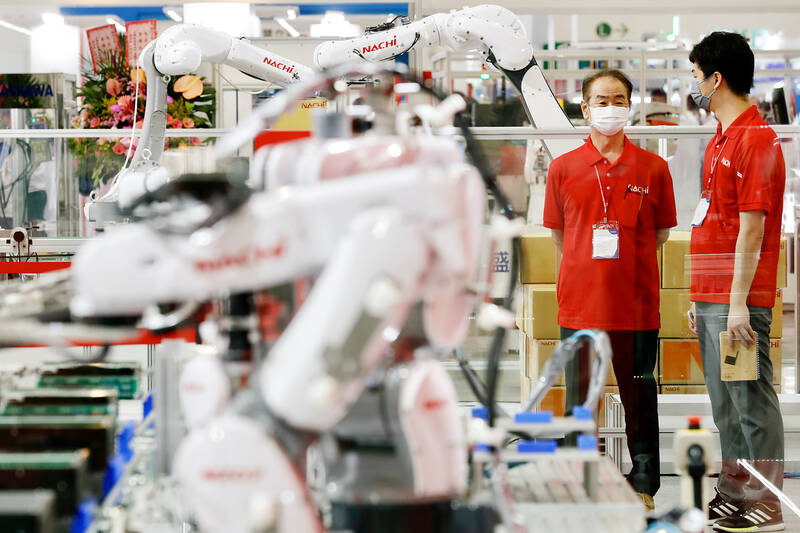Local business confidence last month weakened across all sectors, as high inflation at home and abroad slowed inventory digestion and consumer spending, the Taiwan Institute of Economic Research (TIER, 台灣經濟研究院) said yesterday.
The decline in sentiment was most evident among manufacturers, with the climate gauge shedding 1.09 points to 85.04, dropping for the ninth straight month to its lowest point since May 2020, the Taipei-based institute said, citing its monthly survey.
Consumer price hikes, monetary tightening and geopolitical tensions are taking a toll on global demand for tech and non-tech products, explaining why chemical product exports tumbled 10 percent last month, with 60 percent of local suppliers feeling the squeeze, TIER said.

Photo: Ritchie B. Tongo, EPA-EFE
Sentiment remained conservative, although demand for electronics used in vehicles and new smartphones held firm, the institute found.
As a result, only 12.1 percent of local manufacturers had a positive view about their business prospects for the coming six months, down from 15.2 percent a month earlier, it said.
The number of firms with negative outlooks rose 2.1 percentage points to 43 percent, TIER said, adding that conservative outlooks were common among manufacturers in the chemical, metal and machinery sectors.
Firms in the service sector reported a slowdown in business, with the confidence measure falling 2.03 points to 94.02, after a seasonal uptick linked to the summer vacation came to an end, it said.
Last month, most hotels and restaurants said that business was flat, while proprietary traders and securities firms took a hard hit from major TAIEX corrections, the institute said.
Looking forward, a recovery in domestic demand seems questionable, despite the reopening of Taiwan’s borders, it said.
As countries in Asia lift COVID-19 restrictions, Taiwanese are likely to prefer trips overseas, which could reduce domestic tourism spending, TIER said.
People could also become cautious about spending due to consumer price hikes and investment losses, it said.
Consequently, more than 80 percent of retailers are neutral about their business outlook for the coming six months, the institute said.
Restaurants are looking to benefit from year-end feasts and gatherings, as well as the arrival of foreign tourists, TIER said.
However, labor shortages would slow the pace of recovery, it added.
The business confidence measure for the construction industry dropped 2.55 points to 90.72, it said, adding that civil engineering firms are ramping up construction of public works projects before the end of the year, but property developers are slowing the pace, as sales rates have been disappointing amid economic uncertainty and construction costs remain high.
The construction sector expects business to be flat, based on government budgets and the economy changing gears, it said.

MULTIFACETED: A task force has analyzed possible scenarios and created responses to assist domestic industries in dealing with US tariffs, the economics minister said The Executive Yuan is tomorrow to announce countermeasures to US President Donald Trump’s planned reciprocal tariffs, although the details of the plan would not be made public until Monday next week, Minister of Economic Affairs J.W. Kuo (郭智輝) said yesterday. The Cabinet established an economic and trade task force in November last year to deal with US trade and tariff related issues, Kuo told reporters outside the legislature in Taipei. The task force has been analyzing and evaluating all kinds of scenarios to identify suitable responses and determine how best to assist domestic industries in managing the effects of Trump’s tariffs, he

TIGHT-LIPPED: UMC said it had no merger plans at the moment, after Nikkei Asia reported that the firm and GlobalFoundries were considering restarting merger talks United Microelectronics Corp (UMC, 聯電), the world’s No. 4 contract chipmaker, yesterday launched a new US$5 billion 12-inch chip factory in Singapore as part of its latest effort to diversify its manufacturing footprint amid growing geopolitical risks. The new factory, adjacent to UMC’s existing Singapore fab in the Pasir Res Wafer Fab Park, is scheduled to enter volume production next year, utilizing mature 22-nanometer and 28-nanometer process technologies, UMC said in a statement. The company plans to invest US$5 billion during the first phase of the new fab, which would have an installed capacity of 30,000 12-inch wafers per month, it said. The

In a small town in Paraguay, a showdown is brewing between traditional producers of yerba mate, a bitter herbal tea popular across South America, and miners of a shinier treasure: gold. A rush for the precious metal is pitting mate growers and indigenous groups against the expanding operations of small-scale miners who, until recently, were their neighbors, not nemeses. “They [the miners] have destroyed everything... The canals, springs, swamps,” said Vidal Britez, president of the Yerba Mate Producers’ Association of the town of Paso Yobai, about 210km east of capital Asuncion. “You can see the pollution from the dead fish.

Taiwan’s official purchasing managers’ index (PMI) last month rose 0.2 percentage points to 54.2, in a second consecutive month of expansion, thanks to front-loading demand intended to avoid potential US tariff hikes, the Chung-Hua Institution for Economic Research (CIER, 中華經濟研究院) said yesterday. While short-term demand appeared robust, uncertainties rose due to US President Donald Trump’s unpredictable trade policy, CIER president Lien Hsien-ming (連賢明) told a news conference in Taipei. Taiwan’s economy this year would be characterized by high-level fluctuations and the volatility would be wilder than most expect, Lien said Demand for electronics, particularly semiconductors, continues to benefit from US technology giants’ effort